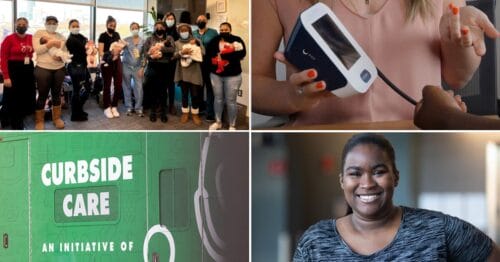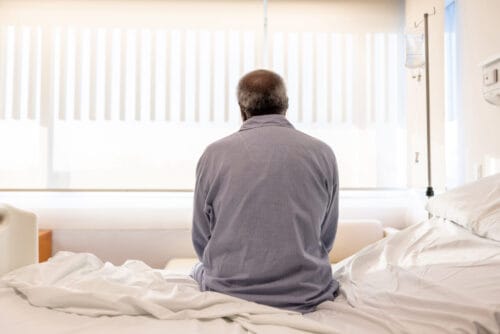The 5 Stories Our Readers Loved The Most In 2023
December 7, 2023

Travis P Ball, Getty Images; Boston Medical Center; Hello Africa, Getty Images; Elijah Nouvelage, Getty Images; Boston Medical Center
This year’s most popular stories include myth-busting about loved ones with addiction, abortion bans, and how a rotation in Haiti changed the course of one doctor's career.
As we approach the new year, HealthCity is looking back at 2023 and all the stories we shared this year that moved us and our readers. Throughout the year we covered many important moments in health equity and innovation: from the stories of Black fathers who lost their partners during childbirth to the key ways loved ones can support someone living with substance use disorder, to how Black women are bearing the burden of nationwide abortion bans. These are the stories you loved the most in 2023:
1. Fathers Who Lost Partners to Pregnancy-Related Deaths Are Dedicating Their Lives to Birth Justice
When Shamony Gibson, 30, and Amber Rose Isaac, 26, both died due to complications from childbirth, their respective partners, Omari Maynard and Bruce McIntyre III were determined to call attention to and seek justice for Black birthing people across the country. Last fall, Maynard and McIntyre spoke at Boston Medical Center’s Vital Village Network’s Annual National Community Leadership Summit and back in February of this year HealthCity did an in-depth coverage of their advocacy. To honor the life of Shamony Gibson, read more about the ARIAH Foundation. To honor the life of Amber Rose Isaac, read more about the saveArose Foundation.
“I think the importance about speaking to these fathers is knowing that they have a voice and knowing there is power within being vulnerable with one another,” McIntyre said during the Vital Village summit. “Often men feel like they can’t speak up because they don’t have a voice, or as men we are taught to be tough.”
2. Thea James on How Her Rotation in Haiti Changed her Medical Career
Back in February, Boston Medical Center hosted a panel for community and clinical leaders where attendees had the opportunity to hear about racial history in Boston and how health systems can pivot to providing more equitable care. James spoke about meeting a Haitian patient during her rotation who opened her eyes to the stigma and marginalization that immigrant parents face, inspiring her to do a global rotation in Haiti and contributing to making health equity her life mission.
“I had a patient here who was from Haiti. After they diagnosed him with HIV, he looked at me and said, ‘I don’t have that. If I have it, you gave it to me.’ And I knew immediately that it was about me,” says James, “I knew it wasn’t about him. … The fact that he rejected the diagnosis made me realize I was missing something. So, I was the first resident in Emergency Medicine to actually do a global rotation because I felt like I just graduated from medical school, and if I’m no better than this, then I’m in trouble.”
3. Busting 4 Myths About Supporting a Family Member in Addiction Recovery
It can be difficult to know how to support a family member or another loved one who is dealing with substance use disorder. Often the messaging surrounding supporting a loved one through addiction treatment is one of “tough love” or even that families bear some responsibility for their loved one’s substance use disorder. Boston Medical Center’s vice chair of Addiction Psychiatry Amy Yule, MD, and the Grayken Center for Addiction’s director of special projects Alicia Ventura, MPH, help bust some myths around caring for a loved one with substance use disorder.
“Codependency is not a diagnosis. It was rejected from the DSM-III. It’s somewhat bizarre that there has been so much research and effort to justify that codependency is a real disorder,” Ventura explains. “It perpetuates the idea that caring for family is rewarding self-destructive behavior. The term pathologizes kindness and compassion, the things we know can catalyze positive change.”
4. Black Women Are Bearing the Burden of Abortion Bans
21 states across the country have enacted either total or partial abortion bans since the Supreme Court’s 2022 decision to overturn the landmark legislation, Roe vs. Wade. Kelly Treder, MD, MPH, an obstetrician specializing in family planning at Boston Medical Center, sat down with HealthCity at the beginning of this year to speak about how Black birthing people are going to be the ones shouldering the weight of these bans, citing her research on the reproductive health experiences of Black birthing people.
“Black and brown women have had their autonomy restricted for centuries, especially within reproductive healthcare, and this is not going to make the relationship with the healthcare system better,” says Treder, “I worry about the damage that it will do to the already very fractured patient-physician relationship between people of color and the healthcare system.”
5. What Is Antipoverty Medicine?
Poverty is one of the key drivers of health outcomes. As a pediatrician at Boston Medical Center, Lucy Marcil, MD, is intimately aware of this and worked to coin the term, “antipoverty medicine” back in 2021. Earlier this year, she penned an op-ed for HealthCity on the term and what antipoverty medicine looks like in action.
“The important thing to incorporate in practice of an antipoverty medicine clinic is taking a strength-based approach, moving away from screening and toward offering financial resources that we know are available and underutilized that our patients are eligible for, without requiring them to disclose their financial status or lack of resources,” says Marcil, “Instead, these offerings are just the standard of care. It helps avoid stigmatization and shame.”


